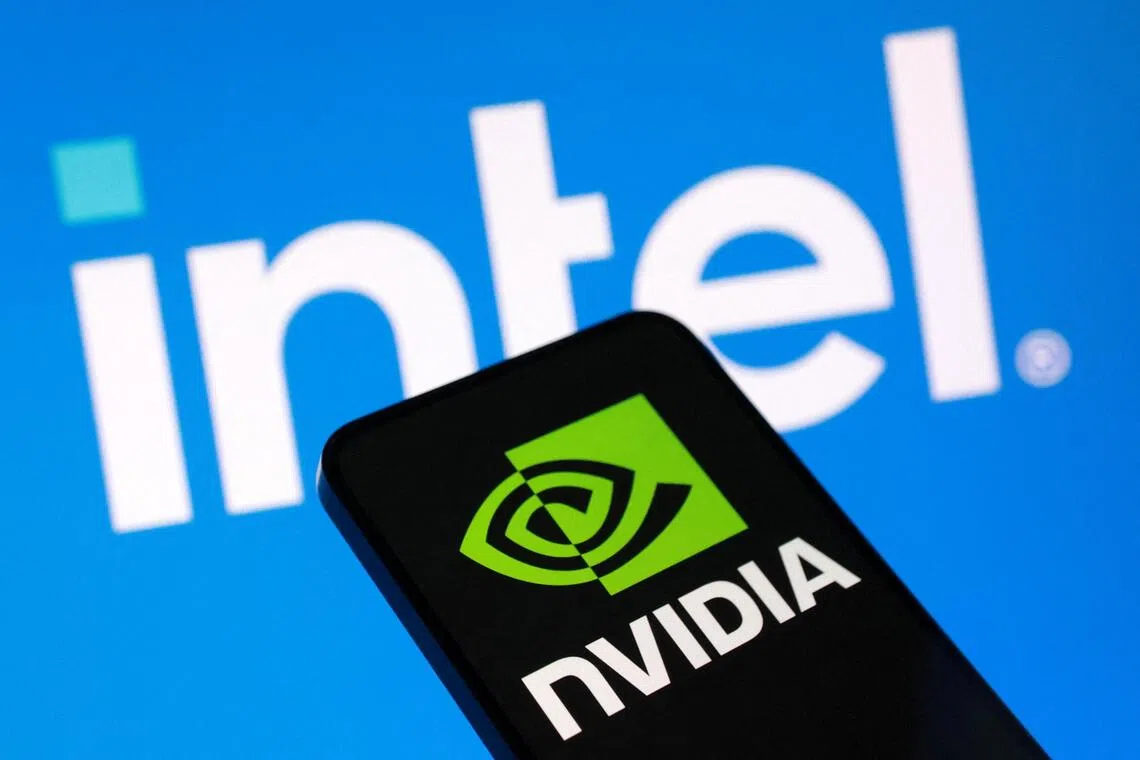Intel shares soar as Nvidia takes $6.4b stake, plans to co-design chips; S’pore-listed AEM jumps
Sign up now: Get ST's newsletters delivered to your inbox

Nvidia’s support offers Intel a new chance after years of turnaround efforts failed to pay off, and it triggered a 23 per cent jump in the US chip manufacturer’s shares.
PHOTO: REUTERS
SAN FRANCISCO – Nvidia said on Sept 18 that it would invest US$5 billion (S$6.4 billion) in Intel, throwing its heft behind the struggling US chipmaker just weeks after the White House engineered an extraordinary deal for the government to take a massive stake in the company.
Nvidia’s support offers Intel a new chance after years of turnaround efforts failed to pay off, and it triggered a 23 per cent jump in the chip manufacturer’s shares on Sept 18. The stake will make Nvidia one of Intel’s largest shareholders,
Shares of Singapore-listed AEM, which counts Intel as a key customer, also rallied on the news. The stock jumped 17.8 per cent to close at $1.85 on Sept 19.
Intel – once the chip industry’s flag bearer that claimed to put the “silicon” in Silicon Valley – appointed a new chief executive, Mr Tan Lip-Bu, in March.
He quickly came under fire from US President Donald Trump, who called for his resignation
Nvidia CEO Jensen Huang told reporters in a call on Sept 18 that the Trump administration had not been involved in the partnership deal, but would have been supportive. Mr Huang was seen with Mr Trump and other business leaders during the US leader’s state visit to Britain on Sept 18
This new pact includes a plan for the two companies to jointly develop PC and data centre chips, but crucially will not involve Intel’s contract manufacturing business – or foundry – making computing chips for Nvidia.
Intel’s foundry business will, however, supply the central processors and advanced packaging for the joint products. Mr Huang said his company was continuing to evaluate Intel’s foundry technology and had been working with the rival for nearly a year.
Most analysts believe that for Intel’s foundry to survive, it will need to win a large customer such as Nvidia, Apple, Qualcomm or Broadcom.
“This is a massive game changer for Intel and effectively resets its position of AI (artificial intelligence) laggard into a cog in future AI infrastructure,” said Mr Gadjo Sevilla, senior AI and tech analyst at eMarketer.
Nvidia, whose must-have chips are powering a global AI boom, said it would pay US$23.28 per share for Intel common stock, slightly below the stock’s US$24.90 closing price on Sept 17 but higher than the US$20.47 price the US government paid.
The companies did not disclose the financial terms of their collaboration, but said they would make “multiple generations” of future products.
The deal adds to Intel’s growing reserve of capital, following a US$2 billion investment from SoftBank and a US$5.7 billion investment from the US government. CEO Tan has vowed to make Intel’s operations lean and build factory capacity only when there is demand to match it.
Risks to rivals
The pact represents a potential risk to Taiwan Semiconductor Manufacturing Co (TSMC). The Taiwanese company currently manufactures Nvidia’s flagship processors, a business the world’s most valuable company could one day extend to Intel. AMD, which competes with Intel for supplying chips to data centres, also stands to lose thanks to Nvidia’s backing.
“AMD has been seizing market share in desktops and laptops for quite some time, and this will help Nvidia out against its closest domestic peers, but I think TSMC may have the bigger risk to its operation over the long term,” said Mr David Wagner, portfolio manager at Aptus Capital Advisors.
Under the terms of the deal, Intel will design custom data-centre central processors which Nvidia plans to package with its AI chips, known as graphics processing units.
A proprietary Nvidia technology will let the Intel and Nvidia chips communicate at higher speeds than before.
Speedy links are a key differentiator in the AI market because many chips must be strung together to act as one to chew through massive amounts of data.
Currently, Nvidia’s best-selling AI servers with those links are available only using Nvidia’s own chips; this deal would put Intel on equal footing, giving it a chance to make money off each Nvidia server.
The combined Nvidia-Intel chips could also challenge Broadcom, which has chip-to-chip connection technology and helps companies such as Alphabet’s Google develop AI chips.
AMD shares fell 1.3 per cent, while Broadcom dropped 0.5 per cent. REUTERS


